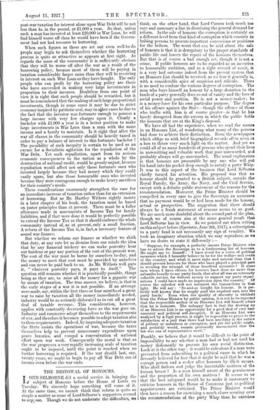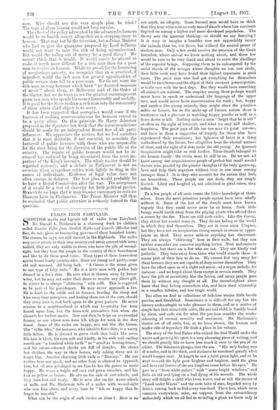THE BESTOWAL OF HONOURS.
ORD SELBORNE did a useful service in bringing the .1-1 subject of Honours before the House of Lords on Tuesday. We sincerely hope something will come of it. At the same time, we cannot think that reform is quite so simple a matter as some of Lord Selborne's supporters seemed to supiose. Though we do not underrate the difficulties, we
think, on the other hand, that Lord Curzon took much too easy and summary a line in dismissing the general demand for reform. In the sale of honours the corruption is certainly on a different level from that kind of corruption which consists in bribing persons to procure important concessions or positions for the 'bribers. The worst that can be said about the sale of honours is that it is derogatory to the proper standards of public life and lowers the repute of the honours themselves. But that is of course a bad enough act, though it is not a crime. If public honours are to be regarded as an incentive to honourable ambition, and as a right reward of merit, it is a very bad outcome indeed from the present system that an Honours List should be received, as we fear it generally is, with a considerable spice of suspicion and ridicule. Thera is no need to confuse the various degrees of corruption. The man who buys himself an. honour by a large donation to the funds of a party generally does so out of vanity and the love of social power and position. He is not a money-maker; he is a money-loser for his own particular purpose. The degree of his offence against the State—though the offence of those who traffic with him is of course greater—is that lie has basely derogated from the esteem in which the public holds the honours that are at the King's disposal. We have all had the experience, when we read the names in an Honours List, of wondering what many of the persons had done to achieve their distinction. Even the newspapers which oblige us with brief biographical records often seem at a loss to throw very much light on the matter. And yet wa could all of us name hundreds of persons who spend their lives in unremitting and valuable work that goes unrewarded, and probably always will go unrewarded. The usual explanation is that honours are procurable by any one who will put his hand into his pocket deep enough to satisfy a party Whip. It was to this aspect of the business that Lord Selbome chiefly turned his attention. His proposal was that no honour should be granted to a British subject, outside the Royal Family, the Army, the Navy, and the Civil Service, except with a definite public statement of the reasons for the recommendation. Moreover, the Prime Minister should be compelled in every case to give the Sovereign an assurance that no payment would be or had been made for the honour. actual or prospective. The suggestion that there should always be a frank statement of reasons seems to us good. We are much more doubtful about the second part of the plan, though we of course aim at the same general result that Lord Selbornc has in view. As we pointed out when writing on this subject before (Spectator, June 9th, 1917), a subscription to a party fund is not necessarily any sign of venality. We took an imaginary situation which we may reproduce, as we have no desire to state it differently :- " Suppose, for example, a perfectly sincere Primo Minister who has to advise. the Sovereign as to a forthcoming list of honours.
Ho might say to himself I have stood for a sorios of politioa measures which I honestly believe to be for the welfare and credit of the country, and what is more right and natural than that should procure honours for those who have playod a principal part
in securing the triumph of those beneficial measures if some men whom I have chosen for honours have Bono no more than eubsoribe heavily to may party funds, that after all was an extrotnoly valuable service, for without money to support my party organi- zations I could have made no impression upon the country.' Of course the onlooker will not interpret the transactions in that light. He will say : So-and-so bought his honour. It is per- fectly well known that he simply paid the required sum into Use party funds.' Even when the quality of sincerity is withheld from tho Prime Minister by public opinion, it is not to be cc:pedal that tho responsible author of an Honours List will himself admit that he is insincere. The unhappy fact is that the drawing up of an Honours List is an opportunity for a good deal of very easy casuistry and political self-deception. If an Honours lest wore analysed by a legal process, it might be impossible to prove to the satisfaction of a ittry that there had been anything in the nature of jobbery or unfairness or corruption, and yet the public might. and probably would, remain profoundly unconvinced that the list was one of representative morit."
Frankl7, we believe that it would be difficult to the point of impossibility to say whether a man had or had not used his money dishonestly to procure his own social distinction. Look at it the other way : it would be ridiculous if a man were prevented from subscribing to a political cause in which he devoutly believed for fear that it might be said that he was a corrupt person and a seeker after honours by illicit means. Who shall fathom and judge the inscrutable motives of the human breast ? Is a man himself aware of the genuineness and the proportion of his own motives ? It seems to us that the best safeguard would be to make it customary to criticize honours in the House of Commons just as political appointments are criticized. The Prime Minister would then have a reason for exercising a much closer scrutiny over the recommendations of the party Whip than he exercises now. Why should not this very simple plan be tried ? The type of sham honour would not long survive.
The effect of the policy advocated by the advanced reformers would be to banish money altogether as a stepping-stone to honour. That may not be the intention, but a Prime Minister who had to give the guarantee proposed by Lord Selborne would not want to take the risk of being misunderstood. But would the ruling out of money be a good thing ? We cannot think that it would. It would surely be absurd to make it much more difficult for a rich man than for a poor man to receive en honour. While we are all for the honouring of meritorious poverty, we recognize that in a practical, if imperfect, world the rich man has greater opportunities of public service than fall to a poor man. We do not want the rich man to reap honours which have " no damned nonsense of merit " about them, as Melbourne said of the Order of the Garter, but we do want to see the greatest encouragement given to is man who spends his money honourably and usefully. It is good for the State to draw a rich man into the community of these whose chief object is to serve. It has been suggested that corruption would cease if the business of making recommendations for honours ceased to be a party affair. On this princinle, Sir Harry Johnston proposed in the Spectator last week that the recommendations should be made by an independent Board free of all party influences. We appreciate the motive, but we feel ourselves that it is most desirable, if not essential, to associate the bestowal of public honours with those who are responsible for the time being for the direction of the public life of the country. The repute of public honours would not be in- creased but reduced by being dissociated from the most im- portant of the King's servants.. The whole matter should be regarded seriously, and a debate in Parliament is not an occasion when scrupulous critics wish lightly to drag in the names of individuals. Evidence of legal value does not often emerge in debates. The best plan would probably be to have a Royal Commission after the war. The acceptance of it would be a test. of sincerity for both political parties. Meanwhile we hope that it may become customary to criticize Honours Lists in Parliament. The Prime Minister will thus be reminded that public attention is seriously turned to this question.



























 Previous page
Previous page